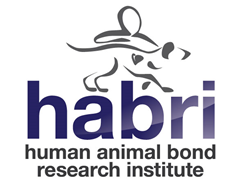
HABRI logo
“As the first project to longitudinally examine the impact of pet ownership on the development of LGBTQ+ young adults, this work addresses an important gap in the field of HAI research.”
WASHINGTON (PRWEB)
November 09, 2021
The Human Animal Bond Research Institute (HABRI) announced today the award of a new research grant to Virginia Commonwealth University (VCU) to examine the relationship between sexual and gender minority (SGM) stressors in young adulthood and human-animal interaction (HAI), investigating how pets may serve as a protective factor for this marginalized population during the transition to adulthood. The lead investigators of the grant are Drs. Rosalie Corona and Shelby McDonald, both in the Department of Psychology.
SGM emerging adults (e.g., lesbian, gay, bisexual, transgender, queer, and other sexual and gender minority identities or “LGBTQ+” ́) are a diverse group of young people facing stigma, victimization, and discrimination at levels that impact their wellbeing. This research project involves a three-wave panel study of 300 SGM emerging adults. Over a 6-month period, researchers aim to identify unique relations between SGM stressors and HAI, exploring how pets are associated with increases in personal hardiness, and whether comfort derived from them buffers the negative impact of victimization on self-esteem. This study will allow researchers to assess these effects over time and identify causal mechanisms that explain the relationship between pets and improved health outcomes, providing further evidence for the role of pets as a social determinant of health.
“This study is the first to longitudinally test whether relationships with pets help this underserved population cope with stress,” said Dr. Shelby McDonald, Co-Principal Investigator. “I’m thrilled to be working with Co-PI Dr. Rosalie Corona, on this project, who brings expertise in reducing risk, health disparities, and improving health behaviors. We expect to find that measures of the human-animal bond, such as attachment to pets and comfort derived from pets, will be positively associated with self-esteem and personal hardiness, and negatively associated with stress and substance use.”
Dr. Corona shared, “Findings from this project have important public health and policy implications for promoting the health of SGM emerging adults and could lay the foundation for health promotion of younger and older SGM individuals.”
“As the first project to longitudinally examine the impact of pet ownership on the development of LGBTQ+ young adults, this work addresses an important gap in the field of HAI research,” said Steven Feldman, president of HABRI. “HABRI is committed to diversity, equity and inclusion and is proud to be funding research to advance this commitment.”
About HABRI
HABRI is a not-for-profit organization that maintains the world’s largest online library of human-animal bond research and information; funds innovative research projects to scientifically document the health benefits of companion animals; and informs the public about human-animal bond research and the beneficial role of companion animals in society. For more information, please visit http://www.habri.org.
###
Share article on social media or email:

